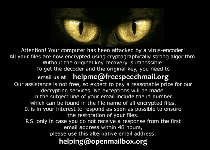‘Helpme@freespeechmail.org’ Ransomware
Posted: December 2, 2015
Threat Metric
The following fields listed on the Threat Meter containing a specific value, are explained in detail below:
Threat Level: The threat level scale goes from 1 to 10 where 10 is the highest level of severity and 1 is the lowest level of severity. Each specific level is relative to the threat's consistent assessed behaviors collected from SpyHunter's risk assessment model.
Detection Count: The collective number of confirmed and suspected cases of a particular malware threat. The detection count is calculated from infected PCs retrieved from diagnostic and scan log reports generated by SpyHunter.
Volume Count: Similar to the detection count, the Volume Count is specifically based on the number of confirmed and suspected threats infecting systems on a daily basis. High volume counts usually represent a popular threat but may or may not have infected a large number of systems. High detection count threats could lay dormant and have a low volume count. Criteria for Volume Count is relative to a daily detection count.
Trend Path: The Trend Path, utilizing an up arrow, down arrow or equal symbol, represents the level of recent movement of a particular threat. Up arrows represent an increase, down arrows represent a decline and the equal symbol represent no change to a threat's recent movement.
% Impact (Last 7 Days): This demonstrates a 7-day period change in the frequency of a malware threat infecting PCs. The percentage impact correlates directly to the current Trend Path to determine a rise or decline in the percentage.
| Threat Level: | 10/10 |
|---|---|
| Infected PCs: | 29 |
| First Seen: | December 2, 2015 |
|---|---|
| OS(es) Affected: | Windows |
 The 'Helpme@freespeechmail.org' Ransomware is a file encryptor Trojan that extracts ransom fees from its victims after encrypting their files. Although malware experts still are researching the 'Helpme@freespeechmail.org' Ransomware's most well-used distribution methods, they can confirm that this Trojan has had campaigns against both personal PC users and business-associated company systems. Although preventing a 'Helpme@freespeechmail.org' Ransomware infection is ideal, various PC security products still are viable for removing the 'Helpme@freespeechmail.org' Ransomware and, in some cases, reversing its encryption attacks on your data.
The 'Helpme@freespeechmail.org' Ransomware is a file encryptor Trojan that extracts ransom fees from its victims after encrypting their files. Although malware experts still are researching the 'Helpme@freespeechmail.org' Ransomware's most well-used distribution methods, they can confirm that this Trojan has had campaigns against both personal PC users and business-associated company systems. Although preventing a 'Helpme@freespeechmail.org' Ransomware infection is ideal, various PC security products still are viable for removing the 'Helpme@freespeechmail.org' Ransomware and, in some cases, reversing its encryption attacks on your data.
The 'Helpme@freespeechmail.org' Ransomware and the Heavy Price of Help
The 'Helpme@freespeechmail.org' Ransomware is a file encryptor using payloads and business strategies similar to those of past threats like the Critoni Ransomware or TeslaCrypt. Like them, the 'Helpme@freespeechmail.org' Ransomware announces its attacks with an image file (currently using a BMP format) that the 'Helpme@freespeechmail.org' Ransomware may generate in the same directory as the compromised files, or lock to your desktop background. Victims of these attacks will find that many files, such as PDFs, TXTs and JPGs, are unable to open due to the 'Helpme@freespeechmail.org' Ransomware's encryption process, which modifies their file data for making them unreadable by their intended programs. Malware experts found all of the affected files easily identifiable through changes to their file names, which included the insertion of id numbers supposedly specific to each infected machine.
Although the 'Helpme@freespeechmail.org' Ransomware's image-based ransom instructions demand payment in return for decrypting your files, malware researchers found little evidence of the 'Helpme@freespeechmail.org' Ransomware's attack being difficult to decrypt. Some PC security companies already are offering utilities capable of reversing the 'Helpme@freespeechmail.org' Ransomware's encryption attacks, although some of these tools originally saw development for other threats (such as the Rakhni Trojan).
Victims of the 'Helpme@freespeechmail.org' Ransomware's encryption attacks also should be reminded that the people responsible for deploying the 'Helpme@freespeechmail.org' Ransomware have no reason to honor promises of restoring your files after receiving any ransom payments.
Your Free Escape Hatch from the 'Helpme@freespeechmail.org' Ransomware
PCs infected by the 'Helpme@freespeechmail.org' Ransomware should undergo full disinfection before any efforts are made to reverse the damage done to your local files. Malware experts advise using dedicated anti-malware tools for deleting the 'Helpme@freespeechmail.org' Ransomware, after which freely-provided decryption utilities may restore your files. The recommended methods for restoring your files may require doing so individually, or rotating attempts among different file sizes and types until your program can find a universal key.
Most PC users also should be able to protect their systems from the 'Helpme@freespeechmail.org' Ransomware and similar file encryptors, with additional, basic security standards. Storing files in safe locations, such as unattached USB drives, can let you delete any affected files and restore the data from your backup. Although some particularly advanced forms of file encryptors are notable for targeting cloud server-based backups, the 'Helpme@freespeechmail.org' Ransomware has shown no indications of doing so, to date.
Leave a Reply
Please note that we are not able to assist with billing and support issues regarding SpyHunter or other products. If you're having issues with SpyHunter, please get in touch with SpyHunter customer support through your SpyHunter . If you have SpyHunter billing questions, we recommend you check the Billing FAQ. For general suggestions or feedback, contact us.